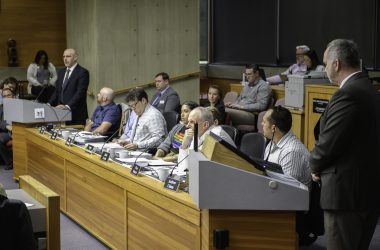In downtown Salem, there’s a 96 year-old-woman in a gorgeous art-deco apartment who was born on Chemeketa Street, and said she’ll die there too. Another Salemite, a poet, grew up in Britain and survived the Blitz. Another survived polio, and had a family member break a champagne bottle with President Warren G. Harding to celebrate the completion of the Alaska Railroad.
For over 50 years, the volunteers of Operation Bookshelf looked forward to monthly visits with Salem’s homebound seniors, a mutually beneficial exchange of stories. The volunteers brought a personalized stack of books, movies, and media from the Salem Public Library, and their patrons revealed more about their lives with each conversation.
The program ended in December, a decision library leadership said was a combination of staff workload and budget concerns. The program, a collaboration with the Assistance League of Salem-Keizer, required intensive, specialized work by library employees that they say was unsustainable.
In January, the Salem Public Library closed on Sundays and cut evening hours during the week, citing a lack of staffing and anticipated budget cuts in the next few years. Cuts at the library were a central discussion point for city leaders as they put forward a payroll tax intended to address a city budget deficit last year. Voters overwhelmingly rejected it on Nov. 7.
“We’ve been having some conversations over the last few years about the sustainability of Operation Bookshelf,” said Rachel Collins, the library’s learning and development supervisor. “And there’s no doubt that the current budget climate has really just made us arrive at a decision maybe a little more quickly than we otherwise would have.”
Cindy Lynch has been an Operation Bookshelf volunteer for over 30 years, driving the same route through north Salem each month. She said she was floored when she found out the program would be shut down from the assistance league’s newsletter.
“Bookshelf has always flown under the radar. We have worked out of the basement of the library and so we’re not visible. The only people that know us are the wonderful librarians and our patrons,” she said. “I think that probably we’re low-hanging fruit to go in the budget because the librarians are needed elsewhere.”
Last year, 78 people had books delivered through the program because a long-term disability or illness made going to the library a challenge. Collins said the program had a large impact, but for few people, and they’re trying to make limited staff time reach as many people as possible.
The program first started in the fall of 1972, delivering to people in medical facilities then later branching out to anyone with a long term disability or illness. It’s one of several longstanding programs by the Assistance League, which also donates thousands of dollars each year to expand the library’s large print catalog.
The Operation Bookshelf program was capped around 100 people and had a lengthy waitlist, but existing patrons who died of Covid weren’t all replaced, partly to make it more manageable for the librarians.
Lynch said she wishes she and the league members had done more to try to expand the program.
“The saddest part for me is that because we weren’t out there tooting our horn as far as the good we’re doing, and how wonderful it is to deliver books, and have these great friends as a result, it’s easy to say, ‘Oh we can’t do that anymore,’” she said.
“I do believe that Bookshelf is one of those programs that made Salem super special. We don’t do enough for our elderly.”
Volunteers spent about 34 hours a month doing the deliveries, on top of the work staff at the library put in to put the deliveries together.
Alice MacGougan, the senior librarian of adult services, had been leading the program for two years. Finding books for clients often started with a survey, on paper or over the phone, to figure out what kind of books the patron liked, which she said was always fun.
Questions included: ‘Do you like mystery? Do you like romance? Do you object to sex? Do you object to violence?”
MacGougan laughed, recalling a first phone call with one patron who she later learned was a big fan of “spicy” romance books.
“I was reading out the questionnaire of like, ‘Do you object to sex?’ and she said ‘Oh, goodness, no.’”
After the survey, MacGougan would put together the first stack of books for delivery, including staple authors from the genres they liked and trendy titles. The patrons would read her selection and share what they liked or disliked about them. It gave them agency that they may not otherwise get, she said.
“For so many of them, when people come visit them, they’re getting their blood sugar tested, it’s some sort of medical related appointment, or it’s financial,” she said. “It was a service that just boosted many people’s quality of life.”
With their feedback, MacGougan would build another list of books to follow their interests and favorite authors, and to introduce them to new things. The librarians in her position before did the same, and Lynch recalled one man who started out with heavy titles like “War and Peace” but over the years became a devout fan of romantic comedy author Jenny Colgan after the librarian put one in saying “you never know.”
MacGougan managed all the accounts, and said it was too specialized to organize on the computer. Each patron had their own binder where she’d take notes, with a big “NO” written over titles they disliked, so she could refresh her memory on their tastes each month and make sure no one got the same book twice.
MacGougan loved the work and the people, but it was too much. She said she rarely was able to take time off, because no one could do the specialized work in her place. She and Collins made the decision to cut the program in October.
MacGougan informed the patrons in a letter with their November delivery, saying, “This delivery is the last one, and in December the volunteers will return to pick up the books.”
A volunteer, Ann Grim, said the last visits were sad. Knowing they wouldn’t be bringing more books, the group put together Christmas goodie bags using leftover pencils, Kleenex and board games that typically went into the birthday packages.
The program won’t be returning, the librarians said. Grim said it takes a skilled person to do MacGougan’s job, and it takes a lot of time that the volunteers don’t have.
Grim said she hopes neighbors will keep a look out for the homebound seniors near them who won’t be getting the service anymore.
“We have to realize that there’s a lot of people who need a lot of help out there. These are adults who had been the life of the community back in the 70s,” she said.
A personal connection
A dental hygienist, Lynch first signed up for her north Salem route in the early 1990s because she saw a patient’s name on the list.
The patient was a polio survivor, and she was delighted to discover they’d both grown up in Alaska. Through Operation Bookshelf visits, she found out they had mutual family connections and when Lynch would visit her home state she’d bring back photos or local treats.
Last month, her friend celebrated her 81st birthday. Lynch said over the years she watched her go from walking to a wheelchair, and she’s now mostly bedridden. She’ll keep bringing her friend library books, even though Operation Bookshelf is over.
Lynch and her husband first moved to Salem as a student at Willamette University, and said she had no intention of staying but ended up raising her family here because of the community programming. She said she feels like Salem’s priorities are shifting.
“If somebody had told us we would still be in Salem when we were freshmen at Willamette, we would have thought you were absolutely out of your gourd,” she said. “The reason we did stay here was because Salem supported its library and schools so much.”
Though MacGougan isn’t organizing Operation Bookshelf anymore, she assured the seniors that she’s still their librarian. She laughed, recalling a patron who called her directly to request that she put eight Danielle Steel novels on hold for a friend to pick up.
The program ending will give her more time to invest and potentially expand the pop up library delivery system, which brings a big batch of books to 13 group homes and senior assisted living facilities each month. Lynch said she plans to join MacGougan for the Emerald Pointe Senior Living Community stop, where five of her former Operation Bookshelf patrons live.
MacGougan hopes former patrons will be able to designate a friend or neighbor to pick up books for them at the library, or will sign up to get free audio books from the State Library of Oregon’s “Talking Books” program. In her parting letter, she made herself available to help get people started using eBooks and Audiobooks.
“I can’t tell you how much coordinating this service over the past few years has meant to me. I feel honored to have gotten to do this work and will miss it deeply,” she wrote.
Still, she said those won’t replace the feeling Operation Bookshelf gave, that someone cared about their likes and interests and would be at their door this month.
Lynch said the program and has taken volunteers into hoarding and elder abuse situations, and she’s been compelled to make a few welfare calls. Another volunteer hauled books up to someone stranded by a broken elevator.
She said everyone will miss the human touch the program provided.
”The people who are homebound, I’m very concerned about,” she said. “How do we keep those people engaged in the community? I don’t know. I don’t know the answer for that.”
Contact reporter Abbey McDonald: [email protected] or 503-575-1251.
SUPPORT OUR WORK – We depend on subscribers for resources to report on Salem with care and depth, fairness and accuracy. Subscribe today to get our daily newsletters and more. Click I want to subscribe!
Abbey McDonald joined the Salem Reporter in 2022. She previously worked as the business reporter at The Astorian, where she covered labor issues, health care and social services. A University of Oregon grad, she has also reported for the Malheur Enterprise, The News-Review and Willamette Week.









